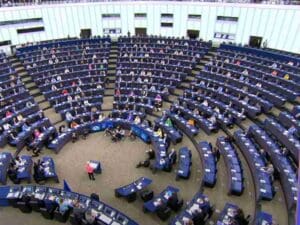
A new programme has been announced by Google and C40, a global network of mayors taking action to confront the climate and energy crisis, to explore and integrate the concept of 24/7 carbon-free energy (CFE).
Pursuing 24/7 CFE means aiming to meet every kilowatt-hour of electricity consumption with carbon-free sources, every hour of every day, every day of the year.
The announcement sees C40 Cities join forces with Google to launch the 24/7 Carbon-Free Energy for Cities programme.
The programme, touted by C40 and Google as a first-of-its-kind, aims to support cities around the world to explore the concept of 24/7 CFE, accelerate the decarbonisation of regional electricity grids, and enable residents to benefit from the clean energy transition.
C40’s 24/7 Carbon-Free Energy for Cities programme will develop and implement strategies, practices and tools to enable cities to achieve 24/7 CFE. Initial pilot cities include London, UK, Copenhagen, Denmark, and Paris, France.
Google will offer each partner city its expertise based on the company’s experience in pursuing a 24/7 CFE goal, including data and critical policy and market reforms.
Each city will also build on its ongoing participation in the C40 Renewable Energy Accelerator, and work to address key challenges outlined in a recent C40 white paper on 24/7 CFE for cities.
Have you read:
Energy crisis response sees Scotland increase smart meter coverage
Holographic digital twin aids infrastructure planning in Florida
How Berlin is making the energy switch to hydrogen economically and socially viable
Piloting CFE
Each initial pilot will focus on different challenges associated with decarbonising urban electricity consumption, including areas such as time-matched clean energy procurement for municipal operations, shifting energy use to times of day when solar and wind resources are most abundant and expanding local clean energy through mini-grids and battery storage.
Across the pilots, cities will explore policy and market reforms that expand access to clean energy and ensure that residents realise the economic, employment and health benefits of the clean energy transition.
Caroline Golin, global head of energy market development and policy at Google, said: “At Google, we set the goal of operating on 24/7 carbon-free energy by 2030 both to decarbonise our own operations and to accelerate the decarbonisation of electricity grids globally. We’ve always known that we cannot achieve this goal alone, and we believe cities have a critical role to play in driving the systems-level changes that are needed to deliver a carbon-free energy future.”
C40 cities in the clean energy transition
The C40 Cities Climate Leadership Group is a group of 97 cities around the world that represents one twelfth of the world’s population and a quarter of the global economy.
C40 executive director Mark Watts stated regarding the role of these cities within the energy transition: “C40 cities are showing once again that they are doers, not delayers. By embracing innovation and partnership, they are not only helping to explore the 24/7 carbon-free energy concept but they are accelerating the energy transition, phasing out expensive and volatile fossil fuels that are the root of the energy costs crisis.”
Cities play a major role in the global energy transition: More than half of the world’s population lives in cities, and urban areas are responsible for more than two-thirds of global energy consumption and more than 70% of global carbon emissions.
Cities around the world need to rapidly decarbonise their energy use, both to help the world meet global climate goals and to enable them to meet their own climate targets, ensure the health and resilience of their communities, and realise the economic and employment benefits of clean energy.
And the benefits of a 24/7 CFE approach are clear: A study released by the Technical University of Berlin, supported by Google, found that hourly matching of CFE reduces significantly more carbon emissions than the purchase of renewable energy to match annual energy needs. Public-private partnerships are critical to achieving this shift.








